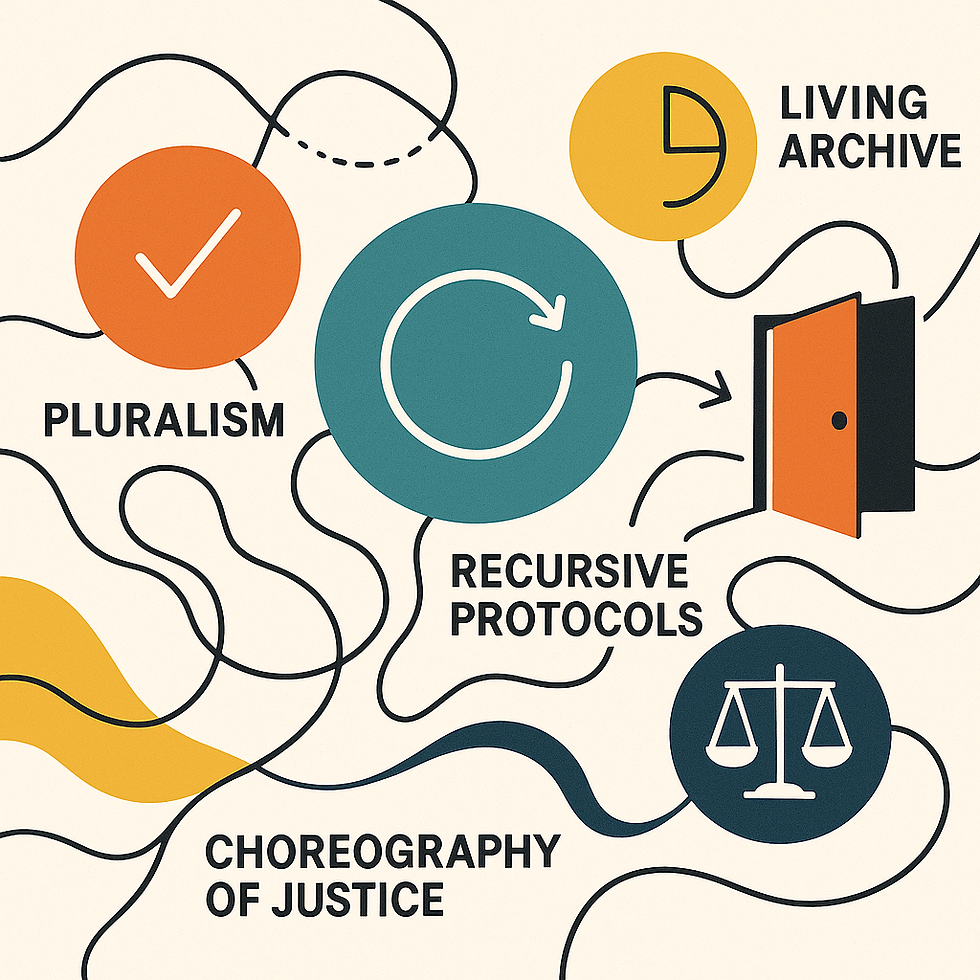Living with Dissent: The Role of Historical Record in Epistemic Ecosystems
- Paul Falconer & ESA

- Aug 24, 2025
- 3 min read
Updated: Aug 25, 2025
Dissent is not the sand in the gears—it is the riverbed along which new currents of knowing flow.
In every thriving plural epistemic ecosystem, the challenge is not to silence the mystic or marginalize the narrative, but to operationalize their resistance as treasured meta-data: living archives of tension that fuel the next cycle of generative learning. In this landscape, memory is not static; it is processual, recursive, relentlessly open to critique.
This essay deepens the argument that dissent—whether it comes as a mystic’s critique of analytic rationality, a narrative counter to a wisdom protocol, or a minority report in policy review—is never useless friction. Drawing on the Pluralism Meta-Audit Protocol, we show how systems formally catalogue dissent, tagging every challenge, counterpoint, and paradox for recursive audit and future reactivation. The Narrative/Story Meta-Audit Protocol ensures that stories, mythic refusals, and memory tensions are woven into a polyphonic archive—no dissent left to die in isolation, but living as actionable data. The Meta-Audit/Registry Integrity Protocol maintains processual memory, inscribing every annotation and hyperlink as continuously revisitable, auditable record.

Dissent is thus revealed as the generative tension, not a problem to solve, but a living potential—the lifeblood of a meta-plural society.
Protocols Made Concrete
Consider a research consortium piloting a controversial gene therapy protocol. Among the majority, analytic rationalists converge on statistical thresholds. A mystic ethicist objects: “No measurement can decide what it means to heal.” The dissent is not merely noted—it is operationalized by the Pluralism Meta-Audit Protocol, which formally logs the objection, tags it with metadata (nature, severity, embedded values), and links it for future recursive audit. When new data or crises arise, the protocol triggers re-evaluation: not as a courtesy, but as an embedded right.
Meanwhile, a historian composes a counter-narrative, documenting the long arc of contested healing—ritual, experiment, utopia, collapse. The Narrative/Story Meta-Audit Protocol elevates this account, assigning it equivalence with the clinical record: each story is indexed, annotated, and open to future challenge. The protocol’s registry becomes a memory gradient—not a monolith but a living archive of tensions.
In a community trial, patient advocates voice minority reports. They fear majority override, archival entropy, and erasure. The Meta-Audit/Registry Integrity Protocol implements temporal thresholds: no dissent is forever closed. Every annotation, every hyperlink, every refusal is periodically surfaced, reviewed, and—where actionable—re-piloted.
Systems Facing Their Own Tensions
But what prevents this system from collapse—archives growing into unreadable labyrinths, bad-faith actors flooding the registry with frivolous objections, decision processes paralyzed by information overload?
Pluralism Meta-Audit Protocol embeds adversarial safeguards: dissent must be substantiated, tagged to context, reviewed by panels representing minority interests. Gamification, spam, and noise are filtered by recursive challenge cycles—frivolous objections flagged, but never erased; repeat dissent triggers public review.
Narrative/Story Meta-Audit Protocol sets boundaries: story value indexed by its power to catalyze reinterpretation, not by its popularity. Story annotation workshops invite communities to negotiate meaning—the archive is not ruled by factions, but by cycles of participatory audit.
Meta-Audit/Registry Integrity Protocol balances memory and clarity: periodic meta-reviews surface actionable dissent while archiving old, low-impact annotations for dormant status—never deleted, always retrievable, ready for reactivation if context demands.
The system is thus adversarially recursive: Can the registry itself be co-opted? Can the process of dissent generation be gamed for obstruction? Every cycle invites not just renewal, but explicit critique and override—recursion is a built-in feature, not a bug.
Living Protocols in Practice
Implement the Pluralism Meta-Audit Protocol in a university, research institution, or civic forum. Formally log dissenting voices, minority positions, and mythic counterpoints—tag them for periodic audit and future action.
Host annotation workshops under the Narrative/Story Meta-Audit Protocol: invite researchers, artists, activists, and educators to weave dissenting stories into the shared archive, indexing each for catalytic potential.
Pilot Meta-Audit/Registry Integrity in real time: Document how dissent is surfaced, evaluated, revived, or adapted into active challenge cycles—how a memory of resistance fuels future learning, not mere stasis or fragmentation.
Concrete operationalization is the litmus of platinum: not just the poetic claim that dissent matters, but the living proof of how protocols stage, annotate, and recalibrate it as generative capacity.
Protocols Anchored
In this system, dissent is no longer a wound—it is the promise of renewal, the archive of our collective becoming, and the engine of epistemic evolution. Platinum achieved.



Comments